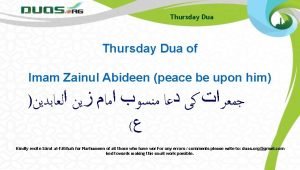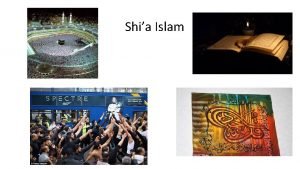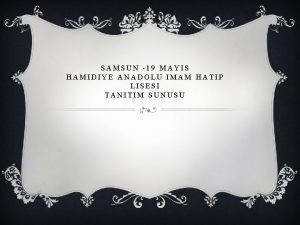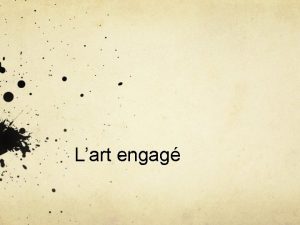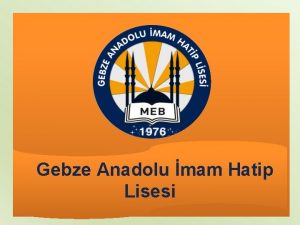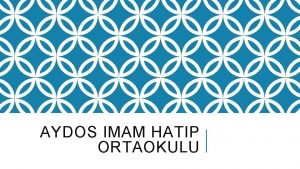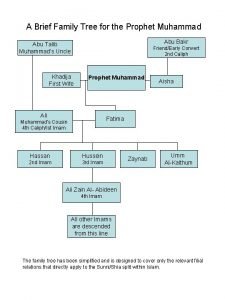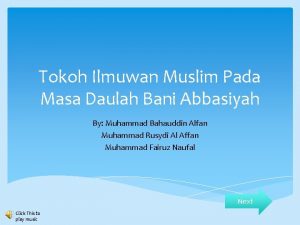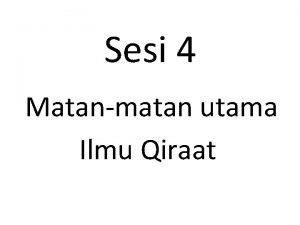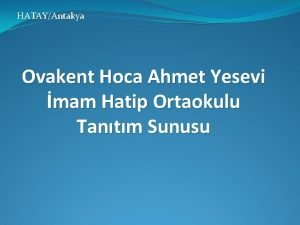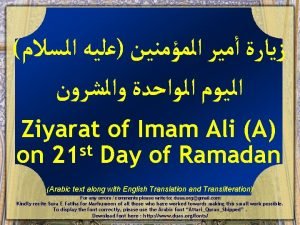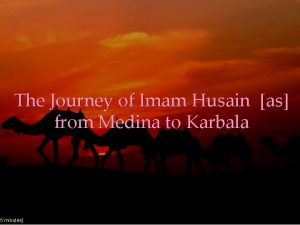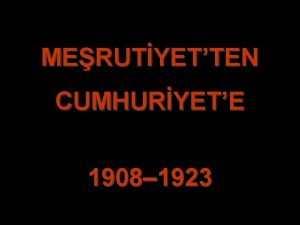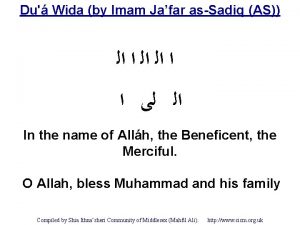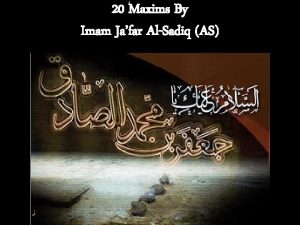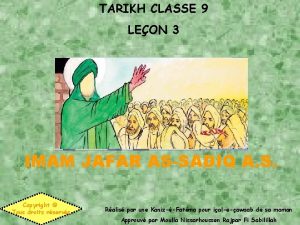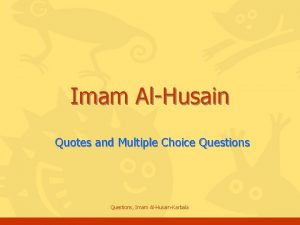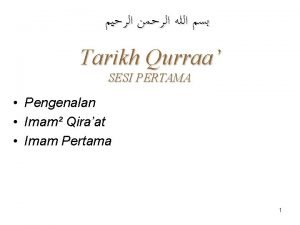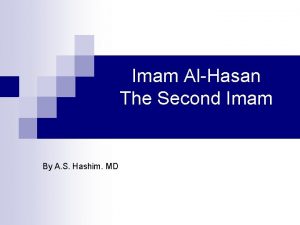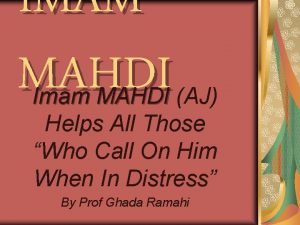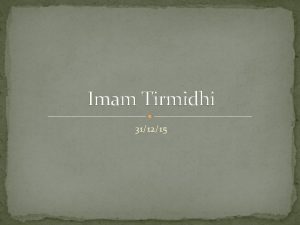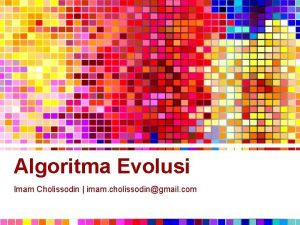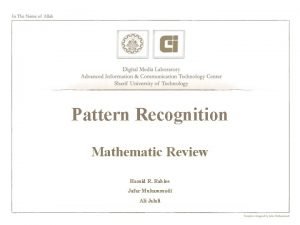Imam Jafar AlSadiqs Life AT WORK l Imam


























- Slides: 26

Imam Jafar Al-Sadiq’s Life AT WORK l Imam Al‑Saadiq used to love to work with his hands, just like his father l They all used to go to the farm or orchard l They expressed their love for this kind of work and called it a noble form of worship (Ibadah). l This was also one of the means of their financial support.

AS A MERCHANT l Imam Al‑Saadiq used to deal as a merchant, selling and buying various goods. l He sent item‑laden caravans to Egypt, Iraq, and other areas, with guides (who also were men of learning) in charge, not only to sell the goods at reasonable prices, but also for the guides to teach Islam and spread its authentic knowledge.

HIS MANNER OF DRESS l Imam Al‑Saadiq used to dress in immaculate clothes. l His clothes used to be a high quality, giving him an eye‑catching appearance. l Yet underneath that he used to put on rough clothes. l When asked, Imam Al‑Saadiq said the outer clothes were in compliance with the times, but the underneath ones were for Allah (swt).

APPREARANCE l Imam Al‑Saadiq had an appearance commanding reverence and high esteem. l He had a cheerful look, often smiling, giving a sense of comfort and ease to people in his company. l He was overflowing with warmth.

THE CROWDS l Imam Al‑Saadiq was usually surrounded by crowds of people, all seeking his knowledge. l He was actively contributing, tirelessly working, patiently explaining, and often recommending to his students to write what they hear to avoid misquoting him, adding or subtracting from what he says.

SCIENCES l At the times of Imam Al‑Saadiq the interest in the sciences of Islam, be it sciences of the Holy Quran, Hadith, Fiqh, or philosophy, were very keen. l Sciences of Kalaam, the art of theological logic was vastly expanded by Imam Al-Saadiq and his school. This dealt with the logistics of theology and all its ramifications. l Imam Al‑Saadiq's brilliant mind went into all forms of sciences of the time, and started new ones, even chemistry.

EVEN CHEMISTRY l Was almost nonexistent l Was more or less initiated by Imam Al-Saadiq and he participated with his student Jabir Ibn Hayyen in that field. l Later on Jabir ibn Hayyen became world famous for his research and discoveries l It is said even Algebra was initiated by Imam Al-Saadiq in conjunction with Jabir ibn Hayyan, a science that was named after Jabir ibn Hayyan wrote numerous books, one of which contained 500 epsitles of Imam Al. Saadiq in 1, 000 pages. (Al-A’laam Al-Zurgulli, Vol. 1 Page 186, as quoted in Al-Saadiq and four Madh’habs, Asad Haidar, Vol. 1, pg 58)

THE SCIENCE OF BIOLOGY l Began to gain importance and connected to the creator l Was often subject of discussion l These sciences were in their infancy stage then, but they had their beginning at this time-period

STUDY OF THE ARABIC LANGUAGE l Grammer and related subjects had their share of studies at this stage too. Added to this was the scholarly discussion of Arabic literature and poetry. l Imam Al-Saadiq also encouraged his students to write and author books for the benefit of others. Knowing human nature Imam Al-Saadiq was afraid the enrollees of the Institute would soon forget, misquote, add or subtract from what he said, therefore he encouraged them to put things in writing right away. He himself did not have much to write, but his students turned fluent and prolific writers

ISLAMIC PHILOSOPHY l Imam Al-Saadiq was one of the very first that dealt with Islamic Philosophy, long before anyone knew about the Greek philosophy l Some people regard Al-Saadiq as the father of Islamic philosophy or the one who established it.

NUMEROUS BOOKS WRITTEN EXAMPLES OF SOME l l l l l Meanings of the Quran Book of Readings 400 Books of Usool Classification of Fiqh Warfare Tradition of the Prophet (pbuh) Jurisprudence Being a Judge Tafseer Al-Tawhid Imamah Rebuttal of the Zandeeq (Disbelievers) Biography of the Prophet (pbuh) Knowledge and Comprehension Science of Kalaam (Logic and Philosophy) Rebuttal of Mu’tazila Moral purity, among other writers

ETHICS OF HIS CHARACTER l Imam Al‑Saadiq was the most ethical person, one who scrupulously applied the Islamic ethical conduct. l He was the example for others to emulate. l Like his forefathers, Imam Al‑Saadiq was very righteous, a man of great virtue who emphasized piety and was its prototype and model. l It was good that during Al‑Saadiq's Imamah the rulers of Benu Umayya and their administration were ineffective and weak, because Al‑Saadiq was free to teach as he wished. So he gave it every ounce of his energy, taking advantage of an opportunity he knew would not be repeated.

HIS CHARACTER l Just like Prophet Muhammad (pbuh), Ja'far Al‑Saadiq's truthfulness was known wide and far, it was proverbial, hence the nickname of Al‑Saadiq, meaning the Truthful One.

MORE ON HIS CHARACTER l Al‑Saadiq was renowned for his nobility, virtue, rectitude, and integrity among other qualities. l He was hospitable and a very generous person, one who did not like to see discord between his loyalists. l If money matters were a cause Al‑Saadiq would give out of his own pocket just for the sake of creating friendship. ¡ At night Al‑Saadiq frequently distributed food and money to the poor, just as his grandfather Zainul Abideen had done. Al‑Saadiq held the poor in good regard, and he gave in charity repeatedly.

THE UMMAH l The times of Imam Al‑Saadiq were unique; it was during the twilight of Benu Umayya then the dawn of Benu Abbas. l The Islamic nation was the only superpower of the world. l The Ummah stretched from Spain to certain parts of India, included all of North Africa, Syria Proper, Iraq, Persia, Arabia, Afghanistan, part of India, and Central Asia.


THE WEALTH l The wealth and standard of living were much higher than in the past. l Islam was robust and shaping the nation beautifully, despite the political situation. l Iraq was called Al‑Sawaad, meaning the black soil, since not only its soil was very rich and highly productive, but also was crisscrossed by canals (the whole area). l Produce increased the revenue, Jiziah levied on the non‑Muslims, and the Kharaaj, brought enormous amount of money. l Yet, the government was huge, bureaucratic, in need of a tremendous amount of money to finance its various operation.

TRANSPORTATION l Transportation was by animals, therefore news, commerce, and communications were at best slow. Society was very mobile despite the difficulty and hazard of travel.

MEDIA l The media consisted of writing by hand, then copying by hand too, l Therefore verbal means of communication was easier but highly inaccurate. l Literacy was becoming popular and illiteracy was slowly vanishing. l Schooling was more or less by tutoring or holding discourses and circle discussions. This was done at home or in Mosques.

THE GOLDEN CHAIN OF NARRATION l Thousands of Hadiths were narrated and quoted through Ja'far Al‑Saadiq. ¡ He often said, "My Hadith is the Hadith of my father, and his is the Hadith of his father, up to Ali, who directly narrated the Hadith from Prophet Muhammad (pbuh). " This is called the Golden Chain of Narration. l These Hadiths were of immense importance, since they corrected the inaccuracies and set right the contaminations which had crept into this science.

GETS MARRIED AGAIN l Imam Al‑Saadiq got married to Hamidah Al-Maghribiyah, l A pious woman, who was Andalusian (Spanish), or from North Africa. l They had a few children afterwards, the most renowned of them was Musa Al‑Kadhim.

MUSA AL-KADHIM l Musa Al‑Kadhim was brilliant and of exceptional qualities. l He became extremely interested in Imam Al‑Saadiq's teachings. l He grew up very pious, highly learned, and of exceptional capacity for patience. l Al‑Kadhim had an enormous capacity to absorb knowledge.

ISMA’EEL DIES l Isma'eel, the first son of Al‑Saadiq was held in high regard by the people for his deep knowledge and piety. l He was widely regarded as the successor‑to‑be to his father. l Isma'eel was close to his father Al‑Saadiq, he was the one who managed the affairs and functions of the Institute. l It was sad news that Isma'eel suddenly became sick and died in his thirties.

IN HIS SIXTIES l By the time Al‑Saadiq reached his early sixties his son Al‑Kadhim was approaching his twenties. l Al‑Saadiq's following had increased and multiplied. l The Institute of Ahlul Bayt had produced a tremendous number of scholars who wrote numerous books, which were quoted by many other authorities. Al‑Saadiq's following and devotees, (Imamah‑Asserters or Shi'a) were all over, local and far away. His Institute and its sphere of influence was almost like a government inside a government, the Institute was the pride and the very reference of all seekers of knowledge, but the ruling class regarded it as a source of grave threat to their security and high status. This was because the Institute treated them as illegal, i. e. , not governing according to the Shari'ah.

IMAM JAFAR AL-SAADIQ DIES AT 65 l After contributing so much to Islam under various circumstances Imam Ja'far Al‑Saadiq died at the age of 65. l His Imamah was for 34 years during which his genius was the fountainhead for much of the accurate and correct Islamic information that continues up to the present time. l (It is reported that he was poisoned during the reign of Al. Mansoor, probably by orders of the paranoid Khalifa, Al‑Mansoor. ) l Despite the upheavals and political confusion during his lifetime, Al‑Saadiq brilliantly delivered clear, precise, distinct, and authentic Islamic details. The Islamic world owes him a great deal. l His death was mourned by numerous people who held him in the highest regard as the Imam of the time, the representative of Prophet Muhammad (pbuh) at the time.

IMAM MUSA AL-KADHIM NEXT IN LINE l Before his death Ja'far Al‑Saadiq designated his son, Al‑Kadhim, as the subsequent Imam, and he gave him a will containing a treasure of wisdom, and handed him the books constituting the Corpus of Knowledge which Imam Ali had written before. l Imam Al‑Kadhim performed the funeral rituals and buried his father Ja'far Al‑Saadiq in Al‑Baqii, close by the burial site of Fatima, Imam Al‑Hasan, Imam Zainul Abideen and Imam Al‑Baaqir (AS)
 Any queries images
Any queries images Neda jafar
Neda jafar Ppit imam syafii
Ppit imam syafii Imam zain ul abideen dua
Imam zain ul abideen dua Shia-sunni differences chart
Shia-sunni differences chart Samsun 19 mayıs hamidiye anadolu imam hatip lisesi
Samsun 19 mayıs hamidiye anadolu imam hatip lisesi Ja domovinu imam
Ja domovinu imam Agama islam tingkatan 1
Agama islam tingkatan 1 Arman home sweet home
Arman home sweet home Thomas carlyle imam ali
Thomas carlyle imam ali Gebze anadolu lisesi üniversite başarısı
Gebze anadolu lisesi üniversite başarısı Ziyarat mutlaqah
Ziyarat mutlaqah Sultanbeyli aydos ortaokulu
Sultanbeyli aydos ortaokulu Orang kaya kaya imam paduka tuan
Orang kaya kaya imam paduka tuan Uncle of hazrat muhammad
Uncle of hazrat muhammad Imam sibawaihi adalah tokoh ilmuwan di bidang
Imam sibawaihi adalah tokoh ilmuwan di bidang Biodata imam syatibi
Biodata imam syatibi Prof imam subekti
Prof imam subekti Kaymakam mehmet tahir imam hatip ortaokulu
Kaymakam mehmet tahir imam hatip ortaokulu Ovakent hoca ahmet yesevi imam hatip ortaokulu
Ovakent hoca ahmet yesevi imam hatip ortaokulu Tawba dua
Tawba dua Imam ali
Imam ali Ulubey spor lisesi
Ulubey spor lisesi Journey of imam hussain
Journey of imam hussain Imam muhammad bin idris
Imam muhammad bin idris Imam syafi'i adalah tokoh islam dalam bidang ilmu
Imam syafi'i adalah tokoh islam dalam bidang ilmu Cumhuriyetin getirdiği yenilikler
Cumhuriyetin getirdiği yenilikler



